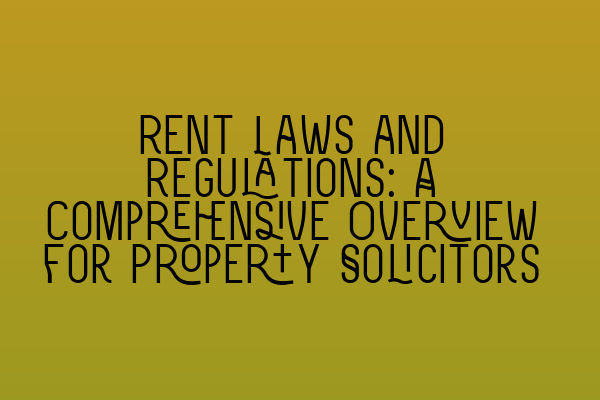Rent Laws and Regulations: A Comprehensive Overview for Property Solicitors
As property solicitors, it is crucial to have a comprehensive understanding of rent laws and regulations. These laws play a vital role in protecting both landlords and tenants, ensuring a fair and lawful relationship between them. In this blog post, we will provide you with a comprehensive overview of rent laws and regulations that every property solicitor should be familiar with.
The Importance of Rent Laws and Regulations
Rent laws and regulations are in place to establish a legal framework that governs the rights and obligations of landlords and tenants. They aim to balance the interests of both parties, ensuring fair treatment and preventing any exploitation or abuse.
Understanding rent laws and regulations is crucial for property solicitors as they provide the basis for resolving disputes, drafting legally sound tenancy agreements, and ensuring compliance with legal obligations.
Rent Control Laws
Rent control laws are regulations that govern the maximum rent a landlord can charge for a property. These laws vary from jurisdiction to jurisdiction and may impose rent ceilings or limits on rent increases.
For property solicitors, it is essential to stay updated on the specific rent control laws applicable to your jurisdiction. This knowledge will enable you to assist landlords in setting appropriate rents, negotiate rent increases, and handle disputes related to rent control.
Tenancy Agreements
Tenancy agreements, also known as lease agreements, are legally binding contracts between a landlord and a tenant. These agreements outline the terms and conditions of the tenancy, including rent, duration, and responsibilities of both parties.
Property solicitors play a crucial role in drafting tenancy agreements that are legally sound and protect the interests of their clients. It is essential to ensure that these agreements comply with all relevant rent laws and regulations to avoid any future disputes or legal complications.
Rights and Responsibilities of Landlords and Tenants
Both landlords and tenants have specific rights and responsibilities under rent laws and regulations. These rights and responsibilities ensure a fair and harmonious landlord-tenant relationship.
As a property solicitor, it is crucial to be aware of these rights and responsibilities to effectively represent your clients. Some common rights and responsibilities include:
- Landlords have the right to receive rent payments on time and in full.
- Tenants have the right to a habitable and safe living environment.
- Landlords have the responsibility to maintain the property and make necessary repairs.
- Tenants have the responsibility to keep the property clean and report any damages or issues promptly.
Dispute Resolution
Disputes between landlords and tenants can arise over various issues, such as rent increases, lease violations, eviction, or maintenance problems. As a property solicitor, you play a crucial role in helping your clients resolve these disputes in a fair and legal manner.
Understanding the dispute resolution mechanisms available under rent laws and regulations is essential. This knowledge will enable you to provide the necessary guidance and representation to your clients, whether through negotiation, mediation, or litigation.
If you need assistance in preparing for the SQE exam, visit these related articles:
- SQE 1 Practice Exam Questions
- SQE 1 Practice Mocks FLK1 FLK2
- SQE 2 Preparation Courses
- SQE 1 Preparation Courses
- SRA SQE Exam Dates
In conclusion, rent laws and regulations are fundamental to the practice of property law. As a property solicitor, it is essential to have a comprehensive understanding of these laws to provide effective legal representation and advice to your clients. By staying updated on the latest developments in rent laws and regulations, you can ensure compliance, resolve disputes, and uphold the rights and responsibilities of both landlords and tenants.
